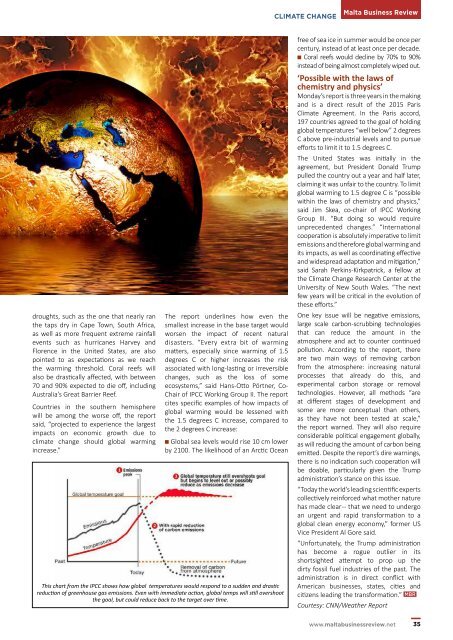MBR_ISSUE 54
A market place for the business community
A market place for the business community
Create successful ePaper yourself
Turn your PDF publications into a flip-book with our unique Google optimized e-Paper software.
CLIMATE CHANGE<br />
Malta Business Review<br />
droughts, such as the one that nearly ran<br />
the taps dry in Cape Town, South Africa,<br />
as well as more frequent extreme rainfall<br />
events such as hurricanes Harvey and<br />
Florence in the United States, are also<br />
pointed to as expectations as we reach<br />
the warming threshold. Coral reefs will<br />
also be drastically affected, with between<br />
70 and 90% expected to die off, including<br />
Australia’s Great Barrier Reef.<br />
Countries in the southern hemisphere<br />
will be among the worse off, the report<br />
said, “projected to experience the largest<br />
impacts on economic growth due to<br />
climate change should global warming<br />
increase.”<br />
The report underlines how even the<br />
smallest increase in the base target would<br />
worsen the impact of recent natural<br />
disasters. “Every extra bit of warming<br />
matters, especially since warming of 1.5<br />
degrees C or higher increases the risk<br />
associated with long-lasting or irreversible<br />
changes, such as the loss of some<br />
ecosystems,” said Hans-Otto Pörtner, Co-<br />
Chair of IPCC Working Group II. The report<br />
cites specific examples of how impacts of<br />
global warming would be lessened with<br />
the 1.5 degrees C increase, compared to<br />
the 2 degrees C increase:<br />
n Global sea levels would rise 10 cm lower<br />
by 2100. The likelihood of an Arctic Ocean<br />
This chart from the IPCC shows how global temperatures would respond to a sudden and drastic<br />
reduction of greenhouse gas emissions. Even with immediate action, global temps will still overshoot<br />
the goal, but could reduce back to the target over time.<br />
free of sea ice in summer would be once per<br />
century, instead of at least once per decade.<br />
n Coral reefs would decline by 70% to 90%<br />
instead of being almost completely wiped out.<br />
‘Possible with the laws of<br />
chemistry and physics’<br />
Monday’s report is three years in the making<br />
and is a direct result of the 2015 Paris<br />
Climate Agreement. In the Paris accord,<br />
197 countries agreed to the goal of holding<br />
global temperatures “well below” 2 degrees<br />
C above pre-industrial levels and to pursue<br />
efforts to limit it to 1.5 degrees C.<br />
The United States was initially in the<br />
agreement, but President Donald Trump<br />
pulled the country out a year and half later,<br />
claiming it was unfair to the country. To limit<br />
global warming to 1.5 degree C is “possible<br />
within the laws of chemistry and physics,”<br />
said Jim Skea, co-chair of IPCC Working<br />
Group III. “But doing so would require<br />
unprecedented changes.” “International<br />
cooperation is absolutely imperative to limit<br />
emissions and therefore global warming and<br />
its impacts, as well as coordinating effective<br />
and widespread adaptation and mitigation,”<br />
said Sarah Perkins-Kirkpatrick, a fellow at<br />
the Climate Change Research Center at the<br />
University of New South Wales. “The next<br />
few years will be critical in the evolution of<br />
these efforts.”<br />
One key issue will be negative emissions,<br />
large scale carbon-scrubbing technologies<br />
that can reduce the amount in the<br />
atmosphere and act to counter continued<br />
pollution. According to the report, there<br />
are two main ways of removing carbon<br />
from the atmosphere: increasing natural<br />
processes that already do this, and<br />
experimental carbon storage or removal<br />
technologies. However, all methods “are<br />
at different stages of development and<br />
some are more conceptual than others,<br />
as they have not been tested at scale,”<br />
the report warned. They will also require<br />
considerable political engagement globally,<br />
as will reducing the amount of carbon being<br />
emitted. Despite the report’s dire warnings,<br />
there is no indication such cooperation will<br />
be doable, particularly given the Trump<br />
administration’s stance on this issue.<br />
“Today the world’s leading scientific experts<br />
collectively reinforced what mother nature<br />
has made clear -- that we need to undergo<br />
an urgent and rapid transformation to a<br />
global clean energy economy,” former US<br />
Vice President Al Gore said.<br />
“Unfortunately, the Trump administration<br />
has become a rogue outlier in its<br />
shortsighted attempt to prop up the<br />
dirty fossil fuel industries of the past. The<br />
administration is in direct conflict with<br />
American businesses, states, cities and<br />
citizens leading the transformation.” <strong>MBR</strong><br />
Courtesy: CNN/Weather Report<br />
www.maltabusinessreview.net<br />
35




